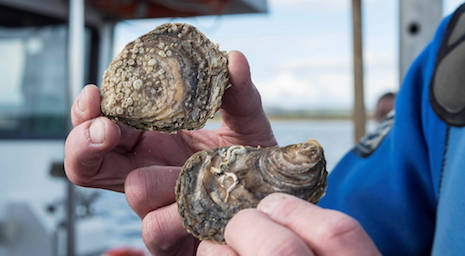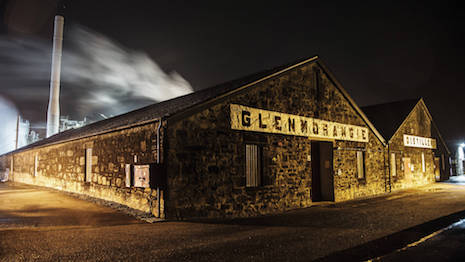LVMH-owned Scottish distiller Glenmorangie has launched a two-fold project to clean the wastewater produced during the whisky-making process.
Glenmorangie’s projects will work to purify and clean the waters near the whisky brand’s distillery on the Scottish coast by reintroducing native oysters and through the opening of an anaerobic digestion plant. Across sectors, brands have launched corporate social responsibility efforts that work to protect the environment from manufacturing.
Purifying and pearls
Glenmorangie’s first step in its wastewater purification project sees the creation of an anaerobic digestion plant to purify the by-products created during distillation.
The anaerobic digestion plant will reduce Glenmorangie’s environmental impact by purifying 95 percent of the wastewater generated from making Scotch whisky.
In addition to the plant, Glenmorangie has developed a partnership with Heriot-Watt University and the Marine Conservation Society in Scotland to work together to further protect the Scottish coastline.
Together the trio has launched the Dornoch Environmental Enhancement Project, or DEEP. The project will work to improve the water quality and promote biodiversity in the Dornoch Firth.
The Dornoch Firth estuary is a site of scientific interest and an important conservation area in Scotland.

Oysters will be reintroduced to the Dornoch Firth estuary in Scotland
As part of DEEP, Glenmorangie and its partners will work together to reintroduce native European oyster reefs that have died off in this part of Scotland. Doing so will clean the remaining 5 percent of organic waste in the water that the plant cannot process.
“Oyster reefs are among the most endangered marine habitats on Earth and it is thanks to Glenmorangie’s commitment that we have been able to create this project, which we hope will become an example that could be replicated in other parts of the world,” said Dr. Bill Sanderson, associate professor of marine diversity at Heriot-Watt, in statement.
Heriot-Watt researchers will study the oysters with the op of establishing a full reef within 5 years. In addition to purifying Scotland’s water, the project will also prevent the extinction of the European oyster.
In addition to its CSR efforts, Glenmorangie has also upcycled its materials to breathe new life into used scotch casks.
The distiller has teamed with handmade sunglass brand Finlay & Co. to create shades made from repurposed oak cask barrels Glenmorangie has used for its scotches. Since each oak cask has a unique wood grain pattern, each pair of Finlay & Co. sunglasses will be distinct, a bespoke quality likely of interest for discerning scotch drinkers (see story).
{"ct":"P6gK0zXp3mLcrIOITvAkSVgx\/CWxJ5E6X7HAmlqpxRJH4mCo2fu7+s7p\/e4Ev7HidLuOCJEpwt7i9DaO85SFbcHnfa7Ru86Peg8CAwUNXyD8ZesbtkIV6skFl5AKFfAE\/Al3n0ag9aDbuLlD5D\/qMqZHj3KvFpGrnb6BqqT9VrRndp3ddQLsYT8\/BH4aZeayENSjo22rGOjiPHqem6TLGfSjq09BHiaXC7LdD9h6IkTSXTlKyXXY0FbdTEFXFX5VzkrcswEMkdNpon5Ha0lsjMLbk4t5ApEIbrZ7OZeHk+YrKcUhfCJVLYnAB43cmBYrl+6gkO4rTKR6lZN84g7PSN6aWwUNtyKyiys0ZYsAUtI0x4ddbMzToEfKezH9P6hq3J1gPnOSUQ4l5HeGizMyzxqpmCqY107Dn5Pq4kfVmnUts+10sJm4t4eW6gwrSpUzM5CILAq7C5ssCLpKggg1Nbthggbm2I\/DkQKSMCxySVAS+PzjzMUrhyuLJUVk0Nyw6KQcBi6iDkQpJoiWcCooZ\/iSD0UG13J2dLk9RqH0yqcDQpa8LvwfIq4aaykf+M84bmHD9cmq+FKxe9TduMj\/qdbYDQ7aJdAktxKgr+yT1pF8J6qDPyz4XNwyhUmDt\/caKi74+z2P07u2qgLI6noodZctB9Qaauzuurq3qscItTHKFqyJanVMifCjVC+I9Jr8RvvbG3xRuyDgLAxQHtDdzCsHlK0aRzL9\/O4AbS71yWl0dyfcftyRmNWABN+P5xrWNGEDbPlqKCJvs2ZbDfm9AIbSPrYjytKKzMUVzLi8G+abkGCgNnryqbGcQDWvdCAkRAg4h3BdC0X0R3oRxXKN+Q3VgcLcle+8WiS70QVc3RR0lTKf4BkfDalvXp8N9BhYKEZ29AYXSYINGT\/MPWrAy3TXylTV5blxEEtc8w75wcCK6jj1qz+OIiQk54U9qQgtKgqoRQOE1gFQ5s5sz\/f5gLanGDMnkMGVFyGzHSBUdlIauEy604efHLz7eRZARdZEcbCT2ZJEeotz1TAPgtBt27ZYVqGsEckuZ\/Iz2XiRRGdPvopwILoi8NZDaKfTNPbmVC63R93H70rzJ02VLHhFFkxYq8GhBrCx6PpWsCJ09EKG8RI+YnHP3Svp9iYqIjwVD9uI9x6vNfzQIQlo5cv5FkVHM1H\/6W+U6VB0A4TGALtAZRP699oHiRur2x68DyygZ2HGBMdaW2wGb1GtA\/l0wvviBSj6Tc7IXdfrZzfYZl1hP130mT4\/zXBgW5+GZVxAPmULpUPi+JPC8AMNLOfdf1YIHsa+W2xShNWnotPOa8ulrrTXtSAc410Y9uh35MlhsXgv9JivlEQ6ISlvdoQUwg3db\/oJ+vwGv8aZ6ZVu\/whF\/eF58CWZfIiQ0\/GjxJgrBLccuSJHvb6STjjRntj4rWWM+rCOwz7JFVoYxcQVFNVac7nlZmZ9x+CLeJ8qOdmTJvQgB0J+hbtbdGNuJm3zfR2pMAikc61Y5p7\/mgmUeiH6kA\/is5vrplVJ357DdA6UzNNcDWPDQF9oRgexbI2aq0mkbsOVLVcjdcHPeuydTbreEIIZ4qcSAA1SPykc0lCzYIClbP2PLbMIF5OKGIUElXC\/s03xWW9L1fGkfTZmorziGxJOIVpCyJOvDRWYacxQUWstZ6QpmvvoIdVSF1gzCUAPD13ELa+tDZpkcjF2tW4V7mkcrnDek5PnmFZgjkwhBKJnyETJM0VDbvfzYDlMc84s2zYjDld27f5+PIe3aRailZ2gL8ar+mTBlOcYZ1\/4WODIpebr7qrusKZK41UCB3nvnrlCMWgRnYzcFFRDPT9DwTfekIQHfKFmd8xFFg7O\/VJjH\/FA85j0VXVNwJi9uTNfD487XFIJBCgJ1J4jwVAuKKwQYvc6s1ungY24DFCtnbkTJLNL6usEG8FaUD2cJQVxhfk7q7wnDot4uj\/31JPBApeMbmsiy1kkwNue0Y8L63USBB6suJgTaWGsqE3wtVb43Wsarf2IV34PjYJEKosWrT0wnYyY1o9E8y+quuC5OEkvgu\/h95d3+O6Eri9U0Lko21TGNilSP2kl4TN\/K92xzdsc28W0kbVtxbladjebvLkESmgcnCaqCtzUO7Ogl3shDRZ\/HJD15Mw6GUzNvfDo5dlT52EV0KG18PZCvIeJZGX+G7XnOzYljwo5dPRgHQjTcMJ7mxyI6bv6GBnjV915ofNU9M2OwSfxSFtFGDWXOn6dOQfFzrP1sDvRByBYtmQaMQpc7QcP1\/NJFQGZpb51+Vv5W7x695NEemdWb\/fWz0y7tQRBKtUz4GOZFAq8zN1hjznsf3Vk9i2wR9sCKVE\/\/3bqZIAM\/Ede2pJK3HuACqoFrpV8I8V+cuzzQsZGthODT8RDflmqraySnfE2fftOweEAMkj5KX0EO9HXM9P5axsGbTCt6MrXDmp+oKsRVdOB080Lg+JMqn4scnNT8GOOH3OqjIHggUn8+3+W2Q\/dSYoX8EH3JY+7pC+uwZnJ7eiKZWOPDrM1JWd1ZdrdBPPTlSEkXraxz6wnToX1CVmkdfa8K3ulYhBYZICrFyIWNCXJ6WRnjLRnVv2MYgdSSsCPXt1W2UfpeUuU8m+mK7UkYIPDxqTeXid1kgYqpPQfjLbuDOBDfN\/QNtrKfBMLuvU0OR6gzmrIC8ruRqoo9QRRK\/YVHsHIQEa55G\/6e5RKYuThfaskiSlwh1ai3tBYahvBgW6VjrachSmxBEpEpz9AFmPsbWJBzKIoSGwPWAykjfkZsE4r4\/3fAD5igHGCmvL0vrOLWDG64rGzC47Zazl2p6AnuBwx4m7mvQbZPSOJZkAlmPivv8seEX20DCQA0RojUEew1RR2mqKDeWxPd8vlYO9e8xobm7e8CFY7NqIal6KMt04uGEYmK5RnJxEDaHtbJLw+X27rasZgVLYaoCB7PMRwwKwguF5Vog9VupcelRIbL20tBbl85JKhgy0K+AoK5QmgZVAj5tppWvW+C9yxAqEXEdub0FnHUiL2UmS8iPFkVclzAY8TeTAXfa6JBTUfuS36Po6bslHWXUzcAPxWL7AOOnrgUj4LCVCoV3Ub8NfRdkt8NZCltTjWf+xmiLhsjYMPSXYbV6U8XSrfGIIEH0Oh4HmM5U7bf7rH3WdlFxOmjVvKswxIVOEOFG1Hx3CB10M55boHJKE\/7i65Wb36fSwBvz6N6YSf3Ut3247U6BxV8VfoPeUoOYoYCZ3QevAztkSWcvQFGsSOMePoTUbv35gcybxNp8DcAUpkCMeGAT\/QJmgDafUc87AhmIGfrbSSPPCYg8NZTE5rI8Xh9tb3eXIsxX0LA9NZ6QaYdVgwz0I4PF\/4WDgCqDk5Mp9DJXO8U269vTlHqghm5Ufg+OHv4KRq8LL\/s6USY4irWkLDhiu47qfBTjAPvyLioMW7f+oiXV6GK5AGo7EeEmVVhrNflOzqc15XALGmxMTKJIkx1+NqyzH8ceuwZHSZ4tOoiyxI+gK+ud5Da8qF3A4G3rmP\/gVDgBxGAtStd1a8Z5nxdgHjZNhjotPQfFN4+jgNWhyxHOpDewwlLNmMTvG9NwSu5kz7kZz76lZspfNpUJvnUILKKbA4myxMWRqtoAje6SRUaLlSHCkhOejCU7c13Q1fdonv7ak75FL1oENO8CdUxo4snocaAELqDWUFt1NplJJ0etfUGhROGYQJVwAj6f7gNs\/3iPy7500NxSjapE4vOfsZNX\/NPk5sOIRAZ7KEwfNwjMw3avx78Q7XHy0cv7pxKq1cW+UPIy4QJzkkbbdPZmKJqo5dCHFqTtb4ikKX4Zy6WXEzWHgiEhVf9bVMYKswTT6RfZBNx9ac0RqN5YAe9cLTizQBaylT7cBmrJqkvV9aRj4yccPMFg+s6214yDA59wmxcCoJqsX9fgZJALlLWP4L6NKQSnHqb6MxPvDeyLaOaONh7rsAM+twTPucESoOeJgSsSId+aca3wOzsgZgpMOUjyi8jPwxF6CiMQ88Foc+Cneyq8xYPp77ZN9rqYySaFzDLAau0J42QVf4n7VxKk7UPqKSqAKu+1XnffzjqG3vHFHaOsCtk9gIB+ugSyi7pMZbNg3QEzqRN1i7xw+G4PoZ3yk\/Vt5PozSef+EihK55T2Afn258alX3TJHWsKkhCKvT9nz5rQmgd0TQb0iQ41pRG87BUQA1jkPsRIWpCB0aakMq8AG1klqU69BEHuD4FOgG1Cl+eU1B6EL8prUlb3IyAr0Jm45KqIl80JkKbvBuPf+eGeEGpArgk2aGKo2kAJt7SeN\/iOvPv1axm1m1yQtnY8jfSLUV5cgduM8kdL2JbN6vZER9ULFn10FzrhYzLjeuG6r\/xJTi\/cnM1+CgUzIEyHd9kEYbVkggYQMSU2BYsRHIBsTx20OAW3Xn0UhDlWj41UyXvakwz2AV1LWmXb4RucFGgf7b1rckf0KqHAUkcbRdUQb5M3md3lW\/OVoSrkN5N9ky0boDOqeoXJMopj\/dyP0l4ZEAuxIwPBOQbRrw5IoRbeCs5+X6T0qAXr0W3pzI8dbLfyLhV4Bpo1PhAuR0jTYRlMhLp2ypAlu0GSo=","iv":"0d3d174e3b6edde1351d4868e272fdde","s":"b34416fb73718fef"}

 Glenmorangie distillery in Tain, Scotland
Glenmorangie distillery in Tain, Scotland